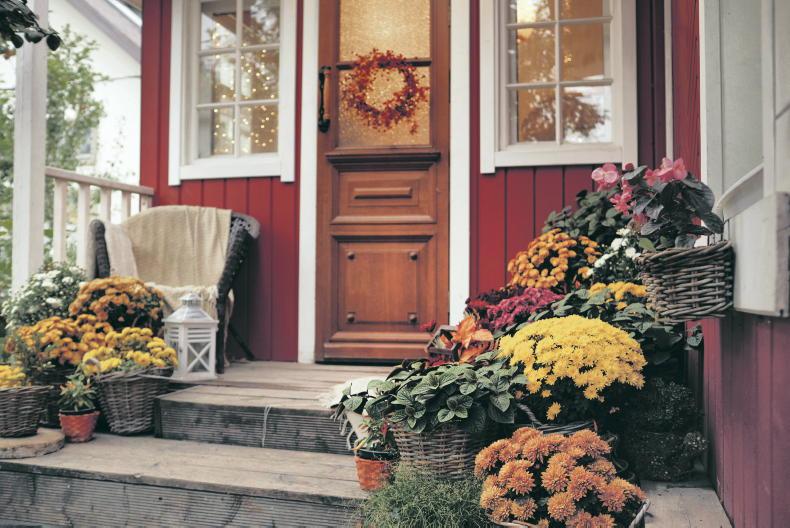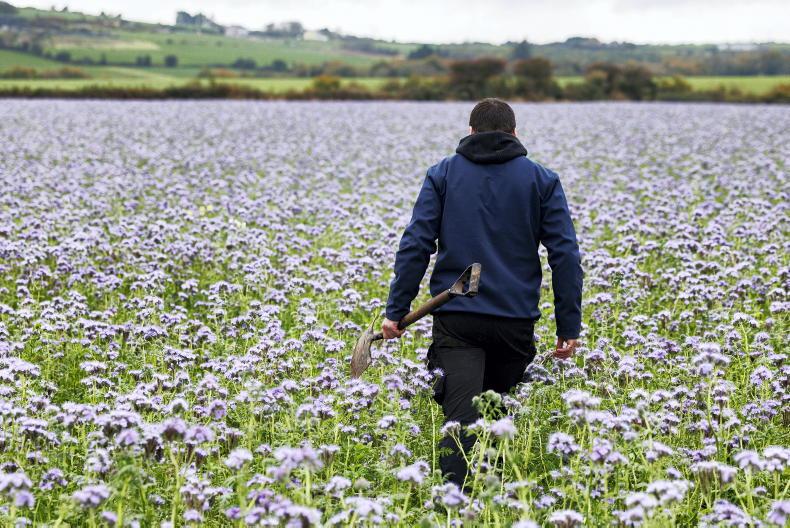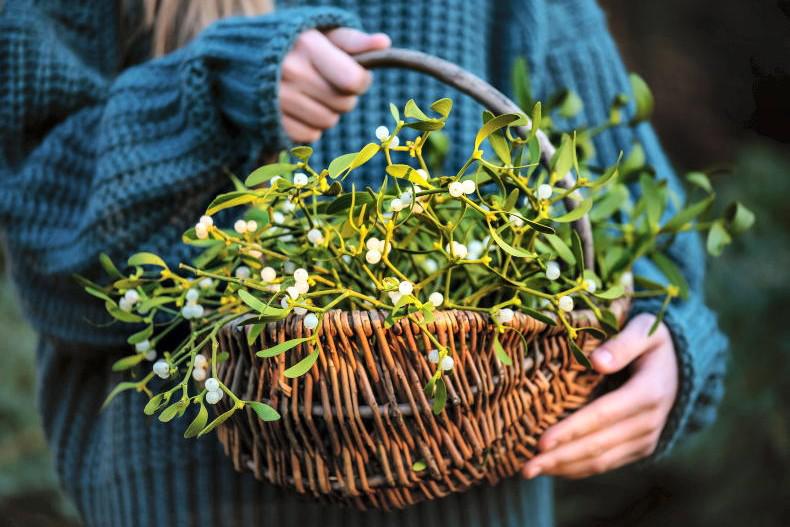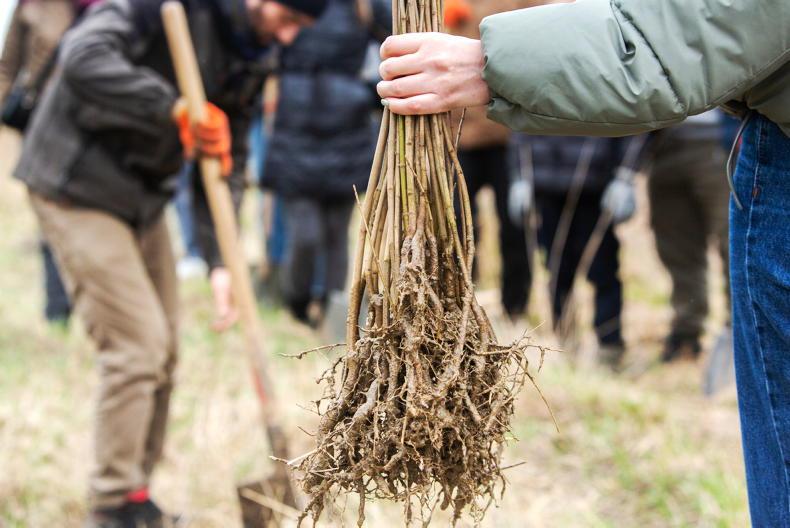Like many budding entrepreneurs, it was during the COVID-19 lockdown when Liz Watkins and her daughter Ali Franks found themselves with the time to develop and test their business idea.
Five years ago this month, the mother-daughter duo planted the seeds, literally, for what would become Clonakenny Flower arm.
Ali, who turns 40 on the day this paper is published, had been working as head chef in Cloughjordan House and had just given birth to her third child when the country went into lockdown.
“With three young children, Ali couldn’t go back to being a chef, it’s very antisocial hours,” explains Liz. “Her husband, Kenny, put up a polytunnel to grow vegetables and we decided to grow flowers.”
Now, the flower farm spans about two acres, with flowers grown and handpicked in the meadows and raised beds. They also grow them in four and a half polytunnels – half of polytunnel number five was blown away in storm Éowyn.
Chemical-free
The flowers, all chemical-free, are arranged in their purple flower studio, a former horse stable that they converted two years ago. Clonakenny Flower Farm is the third business that has been run on the site.
“Our house used to be the old post office in the village,” says Ali. “Before that, there was a forge here, then a post office, and now we have a flower farm.”
While the business started off with Ali selling a few bouquets at the gate of the house, it became something much bigger as lockdown started to ease.
“We started doing weddings when things opened up and people were getting married again. And then we put some pictures up on the great Instagram...” says Liz, laughing.
It may be surprising to some that nearly all of their business comes from Instagram. “We had a website for about one year, but everyone was contacting us through Instagram,” says Ali. “We share photographs from weddings on there, and they’re amazing [for generating interest].”
The visual nature of social media has been a powerful tool for marketing the business. A quick scroll through Clonakenny Flower Farm’s page reveals that no two bouquets are ever the same.
“It’s different every time we do a wedding. There’s such a variety of colours, shapes and textures in homegrown flowers that make the bouquet more interesting,” says Liz. “We don’t get asked for stiff bouquets with perfect roses, people know we don’t do that.”
Growing business
Ali and Liz both describe their style as “natural” and while they have an “endless amount of flowers”, the pair love using foliage in their bouquets, reflecting the wilder beauty of the Irish countryside. Some of the foliage comes from Liz’s own garden in Roscrea.

Liz Watkins and her daughter Ali Franks run Clonakenny Flower Farm in Clonakenny, Co Tipperary. \ Donal O'Leary
“Mam has an established garden with stuff from every house we’ve ever lived in. Mine is more of a newer garden,” says Ali. In the winter months, the pair use the foliage to make Christmas wreaths and last year, they used foliage to design a festive arrangement for a shop front in Roscrea.
Although business is increasing year on year, Liz and Ali are careful about how much they take on. “We don’t do too many weddings because we want to give every one of them the personal touch. We have about 40 weddings booked in for this year,” says Liz.
Working together
The mother-daughter team mostly do local weddings, regularly working with Cloughjordan House, but they have supplied venues nationwide, including the Shelbourne Hotel in Dublin.
“My husband, Kenny, brought them up on the train with him. There are no air miles on our flowers,” says Ali, laughing.

Liz Watkins and her daughter Ali Franks run Clonakenny Flower Farm in Clonakenny, Co Tipperary. \ Donal O'Leary
Weddings take an enormous about of prep work, including conditioning the flowers two days beforehand and giving them a good drink of water.
“Our spring bulbs coming in now [flowers like anemone, sweet rocket, irises and tulips] were put in last October. You’re constantly thinking six or seven months ahead,” says Ali. “The weddings are booked one or two years in advance.”
Liz and Ali are often on-site on the wedding day itself to fix and move arrangements. “When we go up to the bride, you know immediately from their face if they like what you’ve done.
“So far, so good,” – Liz stops to touch the wooden countertop behind her – “they’ve been delighted”.
Ali and Liz talk about bridal flower trends, including cascading bouquets [an arrangement of flowers that trails down from the front] and button holes [small floral decorations worn in the lapel of men’s suits].
Chicken wire and moss
More and more brides are re-purposing their foliage for a day two celebration or distributing flowers among guests as they leave. Some venues also reuse the flowers as part of table arrangements. Instead of the typical oasis plastic foam, Ali and Liz use chicken wire and moss for their arrangements to hold the flowers and foliage in place. It is more sustainable and the moss keeps the flowers fresher.
“We like to go natural with the moss. We go foraging for that up the mountains,” says Ali.

Liz and Ali use moss and chicken wire for their flower arrangements, a more sustainable alternative. \ Donal O'Leary
It is clear that Ali and Liz enjoy a very close bond, both as family and business partners. Each has found their own role in Clonakenny Flower Farm – Ali does more of the marketing, client interactions and business side of things, while Liz concentrates on propagating and sowing.
“While we’re in the polytunnel, we’ll be chatting about what’s coming up,” says Ali. “I’m very lucky because I’m not a great reader. I find a lot of information on pages hard to take in, so I just ask Mam.”
“Well, I don’t always have the answer,” Liz replies.
“You generally have a fair idea now,” Ali smiles.
Both women also learn from other growers in the Flower Farmers of Ireland Network, an organisation championing Irish growers. Clonakenny Flower Farm is part of the network and the women get their seeds from Bell Meadow flower farm in Co Carlow.
“All the growers in the flower farming network are part of a Whatsapp group and if someone is caught for something, we help each other out,” says Ali.
Liz and Ali’s love for gardening runs deep, passed on from Liz’s mother who was also a flower farmer. Now, the next generation of the family is getting involved. Ali’s nine-year-old daughter, Emily helps out. “She has her own presser so she does the pressed flowers which we offer for weddings.”
When it comes to their favourite flower, Liz instantly replies, “Mine would be peonies and sweet pea.”
“Mine are dahlias,” says Ali. “We have about 15 varieties of dahlias in the summer.”
Liz and Ali continue chattering about flowers – different types and how they’re grown – and it’s easy to see why the flower farm has seen such success.
The business reflects a love of flowers and a passion for gardening but more than that, it reflects the joy that this mother and daughter find in growing together.
See Clonakenny Flower Farm on Instagram @clonakenny_flower_farm
Like many budding entrepreneurs, it was during the COVID-19 lockdown when Liz Watkins and her daughter Ali Franks found themselves with the time to develop and test their business idea.
Five years ago this month, the mother-daughter duo planted the seeds, literally, for what would become Clonakenny Flower arm.
Ali, who turns 40 on the day this paper is published, had been working as head chef in Cloughjordan House and had just given birth to her third child when the country went into lockdown.
“With three young children, Ali couldn’t go back to being a chef, it’s very antisocial hours,” explains Liz. “Her husband, Kenny, put up a polytunnel to grow vegetables and we decided to grow flowers.”
Now, the flower farm spans about two acres, with flowers grown and handpicked in the meadows and raised beds. They also grow them in four and a half polytunnels – half of polytunnel number five was blown away in storm Éowyn.
Chemical-free
The flowers, all chemical-free, are arranged in their purple flower studio, a former horse stable that they converted two years ago. Clonakenny Flower Farm is the third business that has been run on the site.
“Our house used to be the old post office in the village,” says Ali. “Before that, there was a forge here, then a post office, and now we have a flower farm.”
While the business started off with Ali selling a few bouquets at the gate of the house, it became something much bigger as lockdown started to ease.
“We started doing weddings when things opened up and people were getting married again. And then we put some pictures up on the great Instagram...” says Liz, laughing.
It may be surprising to some that nearly all of their business comes from Instagram. “We had a website for about one year, but everyone was contacting us through Instagram,” says Ali. “We share photographs from weddings on there, and they’re amazing [for generating interest].”
The visual nature of social media has been a powerful tool for marketing the business. A quick scroll through Clonakenny Flower Farm’s page reveals that no two bouquets are ever the same.
“It’s different every time we do a wedding. There’s such a variety of colours, shapes and textures in homegrown flowers that make the bouquet more interesting,” says Liz. “We don’t get asked for stiff bouquets with perfect roses, people know we don’t do that.”
Growing business
Ali and Liz both describe their style as “natural” and while they have an “endless amount of flowers”, the pair love using foliage in their bouquets, reflecting the wilder beauty of the Irish countryside. Some of the foliage comes from Liz’s own garden in Roscrea.

Liz Watkins and her daughter Ali Franks run Clonakenny Flower Farm in Clonakenny, Co Tipperary. \ Donal O'Leary
“Mam has an established garden with stuff from every house we’ve ever lived in. Mine is more of a newer garden,” says Ali. In the winter months, the pair use the foliage to make Christmas wreaths and last year, they used foliage to design a festive arrangement for a shop front in Roscrea.
Although business is increasing year on year, Liz and Ali are careful about how much they take on. “We don’t do too many weddings because we want to give every one of them the personal touch. We have about 40 weddings booked in for this year,” says Liz.
Working together
The mother-daughter team mostly do local weddings, regularly working with Cloughjordan House, but they have supplied venues nationwide, including the Shelbourne Hotel in Dublin.
“My husband, Kenny, brought them up on the train with him. There are no air miles on our flowers,” says Ali, laughing.

Liz Watkins and her daughter Ali Franks run Clonakenny Flower Farm in Clonakenny, Co Tipperary. \ Donal O'Leary
Weddings take an enormous about of prep work, including conditioning the flowers two days beforehand and giving them a good drink of water.
“Our spring bulbs coming in now [flowers like anemone, sweet rocket, irises and tulips] were put in last October. You’re constantly thinking six or seven months ahead,” says Ali. “The weddings are booked one or two years in advance.”
Liz and Ali are often on-site on the wedding day itself to fix and move arrangements. “When we go up to the bride, you know immediately from their face if they like what you’ve done.
“So far, so good,” – Liz stops to touch the wooden countertop behind her – “they’ve been delighted”.
Ali and Liz talk about bridal flower trends, including cascading bouquets [an arrangement of flowers that trails down from the front] and button holes [small floral decorations worn in the lapel of men’s suits].
Chicken wire and moss
More and more brides are re-purposing their foliage for a day two celebration or distributing flowers among guests as they leave. Some venues also reuse the flowers as part of table arrangements. Instead of the typical oasis plastic foam, Ali and Liz use chicken wire and moss for their arrangements to hold the flowers and foliage in place. It is more sustainable and the moss keeps the flowers fresher.
“We like to go natural with the moss. We go foraging for that up the mountains,” says Ali.

Liz and Ali use moss and chicken wire for their flower arrangements, a more sustainable alternative. \ Donal O'Leary
It is clear that Ali and Liz enjoy a very close bond, both as family and business partners. Each has found their own role in Clonakenny Flower Farm – Ali does more of the marketing, client interactions and business side of things, while Liz concentrates on propagating and sowing.
“While we’re in the polytunnel, we’ll be chatting about what’s coming up,” says Ali. “I’m very lucky because I’m not a great reader. I find a lot of information on pages hard to take in, so I just ask Mam.”
“Well, I don’t always have the answer,” Liz replies.
“You generally have a fair idea now,” Ali smiles.
Both women also learn from other growers in the Flower Farmers of Ireland Network, an organisation championing Irish growers. Clonakenny Flower Farm is part of the network and the women get their seeds from Bell Meadow flower farm in Co Carlow.
“All the growers in the flower farming network are part of a Whatsapp group and if someone is caught for something, we help each other out,” says Ali.
Liz and Ali’s love for gardening runs deep, passed on from Liz’s mother who was also a flower farmer. Now, the next generation of the family is getting involved. Ali’s nine-year-old daughter, Emily helps out. “She has her own presser so she does the pressed flowers which we offer for weddings.”
When it comes to their favourite flower, Liz instantly replies, “Mine would be peonies and sweet pea.”
“Mine are dahlias,” says Ali. “We have about 15 varieties of dahlias in the summer.”
Liz and Ali continue chattering about flowers – different types and how they’re grown – and it’s easy to see why the flower farm has seen such success.
The business reflects a love of flowers and a passion for gardening but more than that, it reflects the joy that this mother and daughter find in growing together.
See Clonakenny Flower Farm on Instagram @clonakenny_flower_farm











SHARING OPTIONS